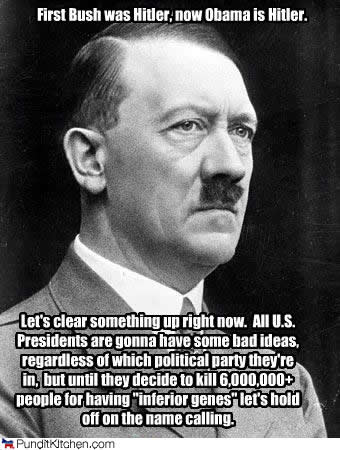The Best We Can Hope For (The Hitler's Mustache Problem)

The ephemera that remains visible in popular culture sometimes seems haphazard and nonsensical.
Consider: I’ve played World War II inspired video games in which it’s a perfectly feasible option to play as a Nazi soldier. I have, on certain evenings, taken great enjoyment in cutting swathes through squads of Allied troops. If it were a matter of political allegiance I’d be weeping, but, instead, I enjoy it. The mechanics of the game are engaging enough, and the interface is cartoonish enough, that I’m willing to ignore the unpleasant truth that I’m playing as a representative of a group responsible for killing millions of people – including those who fought and died for my own freedom.
 Also consider: No one can wear a Hitler mustache. The details of his face may be fuzzy in the minds of many, but all know his mustache, and even people with the fortitude to digitally sling a digital German rifle cringe at the idea of shaving down to the facial hair of a mass-murderer.
Also consider: No one can wear a Hitler mustache. The details of his face may be fuzzy in the minds of many, but all know his mustache, and even people with the fortitude to digitally sling a digital German rifle cringe at the idea of shaving down to the facial hair of a mass-murderer.
Did I mention that this is a post regarding the phrase, “the birds and the bees”?
Cole Porter, in 1928, wrote a song called “Let’s Do It (Let’s Fall In Love)”, which goes a little something like this:
[youtube=http://www.youtube.com/watch?v=WppnwuXwkjk]
We think of this style of song largely as camp these days; we don’t consider the era in which they were created, or the effect that they may have had. Porter remains beloved in the types of circles that collect fat and dusty records, but is mostly forgotten by the rest of the world – and yet he may have left us with one of the most recognizable idioms in the English language.
Several sources give credit to Cole Porter for coining the phrase[, the birds and the bees]. One of the legendary musician’s more famous songs was “Let’s Do It, Let’s Fall in Love.” The 1928 standard contains the lyrics:
And that’s why birds do it, bees do it
Even educated fleas do it
Let’s do it, let’s fall in love
We don’t consider the social revolution that was “Love For Sale”, forcing upper-society to deal with the fact that streetwalkers were a prevalent, and human, underbelly to the city of New York, (and all over America.)
“Love for Sale” was originally considered in bad taste, even scandalous. In the initial Broadway production, it was performed by Kathryn Crawford, portraying a streetwalker, with three girlfriends […] in front of Reuben’s, a popular restaurant of the time. As a response to the criticism, the song was transferred from the white Crawford to the African American singer Elisabeth Welch, who sang with back-up singers in a scene set in front of Harlem’s Cotton Club.
Despite the fact the song was banned from radio airplay, or perhaps because of it, it became a hit[.]
[youtube=http://www.youtube.com/watch?v=Ll1Z-Z9anpU]
Appetising young love for sale.
If you want to buy my wares.
Follow me and climb the stairs
I’d find even MIA or Gaga hard pressed to put out those lines – yet the closest we can get to retaining anything from Porter’s career is the baby talk we use to discuss intimate matters with children, inspired by a song as directly about sexual intercourse as we probably had till the release of Afternoon Delight.
Electric eels, I might add, do it
Though it shocks em I know
Why ask if shad do it – Waiter bring me
“shad roe”In shallow shoals English soles do it
Goldfish in the privacy of bowls do it
Let’s do it, let’s fall in love
The legacy we intend is rarely the one we receive, and often the shorthand we use socially (crazy mustache = crazy war monger, naughty song = sexy time,) can carry on even after its origin has begun to fade from public memory.